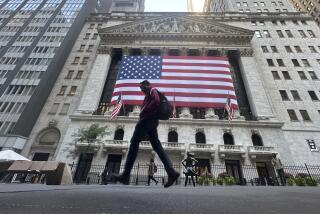Dow Up 20.25; Stocks Stage Broad Advance
NEW YORK — Stock prices rose broadly Tuesday, bolstered by strength in the dollar and bond prices and by foreign buying.
The Dow Jones industrial index rose 20.25 to close at 2,449.78.
Advances outnumbered declines by about 2 to 1 on the New York Stock Exchange, with 1,052 issues advancing, 563 declining and 376 unchanged.
Volume on the Big Board totaled 200.73 million shares, up from 155.01 million on Monday.
The rally began early in the trading session and was sustained through most of the day, although prices retreated slightly in late trading. Analysts attributed the day’s advance largely to foreign demand, especially from Japanese investors, and to the strong dollar and stable bond prices.
The dollar topped the psychologically important level of 150 Japanese yen for the first time in more than three months.
Declines in the dollar earlier this year raised fears of high inflation, which could help depress corporate profits, and in turn pushed bond prices lower and interest rates higher.
The day’s rally was touched off early in the session by Lt. Col. Oliver L. North’s testimony at a congressional hearing on the Iran- contra affair.
The former National Security Council aide said he never discussed with President Reagan the issue of the diversion of funds from arms sales to Iran for use by rebels in Nicaragua. North also said Reagan never raised the issue with him.
There had been speculation in the financial markets that North testimony detrimental to Reagan would weaken share prices.
“Ollie North has apparently taken the President out of harm’s way,” said Larry Wachtel, an analyst for Prudential-Bache Securities.
Despite the strength of Tuesday’s rally, some analysts said the market remained vulnerable to profit taking or to bad news from the stream of second-quarter earnings reports expected soon.
Many investors expect corporate earnings to show strong gains over the second quarter of 1986, even though economic growth remains fairly subdued. But if those expectations are not fulfilled, many observers believe the market might be vulnerable to a setback.
Among actively traded NYSE issues, Texaco was unchanged at 44 3/4, USX advanced 2 3/4 to 35 and AT&T; rose 1/8 to 29.
Cannon Group, the troubled film company, hit a new low of 2 5/8 on the NYSE in heavy trading. It has lost 40% of its market value this week, plunging 3/4 on Monday and 1 on Tuesday. Its 52-week high was 44 3/4. A company officer did not respond to an inquiry about the trading. Last Wednesday, Cannon said it must “immediately” raise adequate working capital to continue operations.
Kidde jumped 9 7/8 to 61 3/8. The diversified manufacturer said it was considering a possible restructuring or sale of all or a major part of its business.
Southland Corp. declined 1/8 to 75 5/8. The company disclosed it was the object of shareholder lawsuits over its proposed leveraged buyout and said it would challenge the suits.
Phillips Petroleum rose 3/8 to 17 7/8; Schlumberger advanced 1 3/4 to 49; Halliburton gained 2 3/8 at 40 7/8; Amax was up 1 1/8 at 23, and General Electric rose 7/8 to 55 7/8.
Nationwide turnover in NYSE-listed issues, including trades in those stocks on regional exchanges and in the over-the-counter market, totaled 236.11 million shares.
Large blocks of 10,000 or more shares traded on the NYSE totaled 4,212, compared to 3,234 on Monday.
The NYSE composite index was up 1.34, at 172.89.
Standard & Poor’s index of 400 industrials rose 3.29 to 358.21, and S&P;’s 500-stock composite index was up 2.48 at 307.40. The Wilshire index of 5,000 equities closed at 3,033.812, up 20.140. The American Stock Exchange market-value index rose 2.50 to 344.45. The NASDAQ composite index closed at 424.55, down 0.55.
In the bond market, meanwhile, prices edged higher in light trading following the dollar’s advance.
The bellwether 30-year Treasury bond rose 7/32 point, or about $2.50 per $1,000 in face value, while its yield dipped to 8.39% from 8.42% late Monday.
Corporate and municipal bonds finished higher in light trading.
Analysts said bond prices got their biggest boost from the rising dollar.
The dollar in recent weeks has strengthened--and bonds generally have followed--because of market sentiment that the central banks of major industrialized nations would intervene to prevent the currency from moving lower. At the same time, the dollar has held a relatively narrow trading range because of speculation that the central banks would move to depress the currency if its value rose too far.
In the secondary market for Treasury bonds, prices of short-term government issues were unchanged to 1/32 point lower, intermediate maturities were up in the range of 1/32 to 5/32 point, and 20-year issues rose 11/32 point. The movement of a point is equivalent to a change of $10 in the price of a $1,000 bond.
In corporate trading, industrial issues were up point and utilities rose about 3/8 point in light activity, Salomon Bros. said.
Among tax-exempt municipal bonds, general obligations rose point in light activity and revenue bonds rose 5/8 in active trading.
Yields on three-month Treasury bills fell 7 basis points to 5.60%. Six-month bills fell 18 basis points to 5.61%, and one-year bills fell 2 basis points to 6.23%. A basis point is one-hundredth of a percentage point. The federal funds rate, the interest on overnight loans between banks, was quoted at 6.563%, down from 6.675% on Monday.
More to Read
Inside the business of entertainment
The Wide Shot brings you news, analysis and insights on everything from streaming wars to production — and what it all means for the future.
You may occasionally receive promotional content from the Los Angeles Times.










